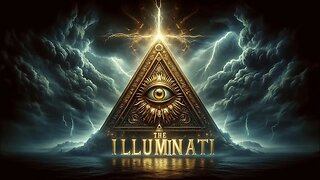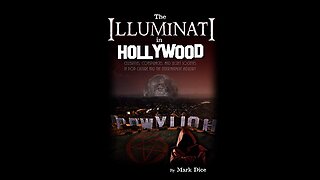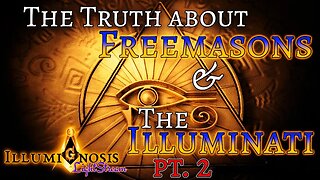Stop Trying To Expose The Illuminati! A Rob Ruiz Rant #realtalk #realtalk #foryou #foryoupage #nyc
The Illuminati Allegations: Deconstructing the Perception of Today's Rich and Celebrities
In the age of information and social media, conspiracy theories have taken on a life of their own, often fueled by misinformation and a lack of critical thinking. One such theory revolves around the notion that today's rich and celebrities are members of the elusive and secretive group known as the Illuminati. This essay aims to delve into the origins of this perception, explore the factors that contribute to its persistence, and critically analyze the evidence and implications of such allegations.
The Historical Context
The origins of the Illuminati conspiracy theory can be traced back to the 18th century Bavaria, where a secret society called the Bavarian Illuminati was founded. This society aimed to promote Enlightenment ideals and intellectualism. However, it was eventually suppressed by authorities. Over time, the term "Illuminati" transformed into a symbol of hidden power and control, laying the foundation for modern conspiracy theories.
Factors Contributing to the Perception
Media Influence: The media plays a pivotal role in shaping public perception. With the rise of digital platforms, information can spread rapidly, often without proper fact-checking. Celebrities' actions, symbols, and choices are dissected by the media, giving rise to sensationalism that can be misinterpreted as evidence of Illuminati involvement.
Sensationalism and Attention Economy: In the digital age, the competition for attention is fierce. Conspiracy theories offer a unique narrative that can captivate audiences. This, coupled with the allure of connecting famous figures to secretive organizations, has contributed to the propagation of the Illuminati myth.
Confirmation Bias: People tend to notice and remember information that confirms their existing beliefs. Those who are already inclined to believe in conspiracy theories are more likely to interpret random occurrences or symbols as evidence of Illuminati involvement among the rich and celebrities.
Complexity Bias: Some conspiracy theories, like the Illuminati, often involve intricate and elaborate explanations. This complexity can create an illusion of credibility, as people might find it difficult to believe that such detailed narratives could be fabricated.
Evidence and Analysis
While conspiracy theorists often cite various pieces of evidence to support their claims, a critical analysis reveals that much of the so-called "evidence" lacks substantial credibility. Symbols commonly associated with the Illuminati, such as the "all-seeing eye" or pyramids, are often used in artistic and cultural contexts unrelated to any secret society.
Furthermore, attributing the success and wealth of celebrities and the rich solely to Illuminati membership oversimplifies the multifaceted factors that contribute to their achievements. Hard work, talent, networking, and opportunities play crucial roles in their success.
Implications
Belief in conspiracy theories, such as the Illuminati allegations, can have far-reaching consequences. It perpetuates distrust in societal institutions, encourages a skewed view of reality, and distracts from real-world issues that warrant attention. Additionally, unfounded accusations can harm the reputation and mental well-being of individuals who are unjustly targeted.
The perception that today's rich and celebrities are part of the Illuminati is a product of historical context, media influence, and cognitive biases. While conspiracy theories can be intriguing, it is imperative to engage in critical thinking, seek reliable sources of information, and recognize that extraordinary claims require extraordinary evidence. Understanding the factors that contribute to the persistence of such allegations enables us to navigate the complex landscape of information more responsibly and thoughtfully.
-
 43:27
43:27
What If Everything You Were Taught Was A Lie?
4 months agoReal Illuminati One World Headquarter Order Out Of Chaos Freemasonry 1776-2024
17.9K4 -
 1:10:24
1:10:24
Eric Hunley - Unstructured
1 year agoUnraveling the Web: QAnon & Cicada 3301 - Deep Dive into the World of Modern Conspiracy Theories
6.81K36 -
 5:42
5:42
The_Library
6 months agoExposed! The Truth about the Illuminati and World Control 🌍
86 -
 1:13:46
1:13:46
GlobalAwareness101
7 months agoTed Gunderson - Former FBI Chief Exposes 'Illuminati' (disturbing content)
5.16K -
 8:07
8:07
KingStreetNews
11 months agoWHEN CLUELESS TRUMPTARDS OF THE TREASONOUS DEMOCRACY CALL US REAL REPUBLICANS LEFTISTS - King Street News
1.13K13 -
 1:07:36
1:07:36
The Michelle Moore Show
1 month agoDocumentary: Agenda Illuminati 'Supremacy of the New World Order'
16.8K43 -
 49:36
49:36
Libertarian99
11 months agoHollywood Illuminati, Sex Magick, & Satanic Super Bowl Ritual with Mark Dice
2.45K -
 38:50
38:50
IllumiGnation
1 year agoThe REAL Truth About Freemasonry and the Illuminati (and why it matters) pt.2
249 -
 13:02
13:02
TheAwristocrat
1 year agoIlluminati Funnel: Rhodes Scholars, Ivy League, CFR... | Gary Wayne | David Carrico | NYSTV
303 -
 3:12:29
3:12:29
Truths Unlimited
1 year agoLISTEN: How We Got Into the Mess Our World is Now in. It Was Planned Long Ago. Dr. John Coleman: "Black People of America, Do Not Trust The Democrat Party. You Are Dispensable to Them.
34K70